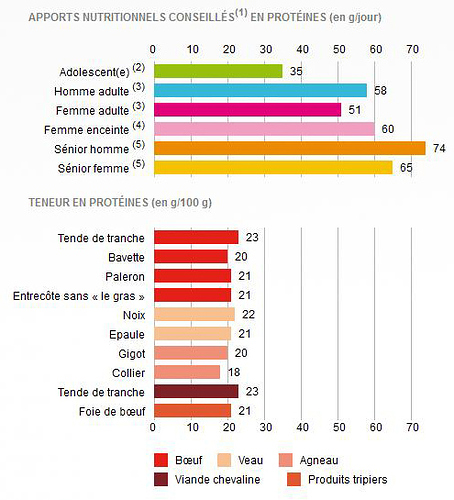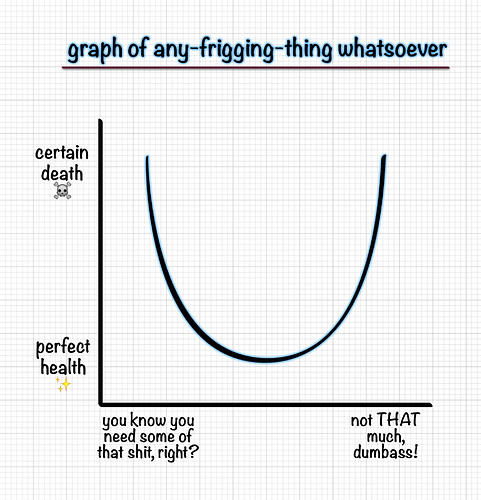100% agree
Is the “too much protein turns to sugar” a myth?
I watched the rest of the vid after your comment. Very good thanks for posting. I had to screen off the guy in the green with my hand while watching. He was so distracting.
No, it is not a myth. Also it stimulates MTOR, which is bad if you are not a youngster! 
Thank you for the video - I thoroughly enjoy the way he explains things and there is a sound basis for his points. Was a great watch
Protein intake per age and gender : French recommandations
Just to show that the effects of protein intake depend on the context and especially on age and gender, I wanted to show you what is recommended in France for eldery people 1.2 to 1.5 g/kg/day
The English version of the recommandations for elderly people is here.
And here is a paper which have a paragraph about protein intake
Par ailleurs, les personnes âgées semblent mal s’adapter à des apports réduits en protéines et il est déraisonnable de proposer un régime avec des apports protéiques inférieurs à 1 g/kg par jour à des personnes de plus de 80 ans. On les expose très clairement au risque de dénutrition avec un niveau de preuve d’efficacité quasi nul.
Which can be translated as : “Elderly people do not seem to adapt well to low protein intake and it is unreasonable to propose a diet with protein intake of less than 1 g/kg per day to people over 80 years of age. They are very clearly exposed to the risk of undernutrition.”
cf Bourdel-Marchasson, Isabelle, and Thalie Traissac. “Place et impact des régimes chez les personnes très âgées.” Nutrition clinique et métabolisme 18.4 (2004): 224-230.
Here is a paper about proteins in meat (which part of meat for what type of amino acid and collagen).
And to sum up all the age/gender difference in one single graph
The recommended dietary intakes of proteins are 1g/kg/day for over 60s in France (0.83g/kg/day internationally according to WHO). They were calculated for an average weight of 65 kg for women and 75 kg for men.
If only we could measure our insulin response to food, not our blood glucose response!!
I like to be simple - carbs = highest insulin response, protein = less insulin response than carbs but more than fat. More protein than our body needs must = more insulin response.
It’s all about the insulin not the glucose.
Gluconeogenisis is demand driven. Our bodies would not demand make glucose just so it could then make insulin, that would be stupid. But it would make insulin if we put too much of one thing thing (carb or protein in).
Insulin response to protein may hold the answer.
Sue, totally agree (insulin response to protein) - and there it still seems a bit fuzzy to me, i.e. it’s not necessarily a linear relationship like “more protein means more insulin” and it’s also going to vary according to one’s metabolic state.
When coming from a fasted state, eating protein actually makes the insulin/glucagon ratio go down. (From that excellent video: “Dr. Benjamin Bikman - 'Insulin vs. Glucagon: The relevance of dietary protein”) He does not give the raw insulin levels, though, which I find disappointing, i.e. is insulin going down or is glucagon going up, or both?
“Standard American Diet” eaters and the like have an Insulin/Glucagon ratio that’s already about 3 times as high as those who eat ketogenically. Eating protein among the keto group barely budges the ratio - it goes up by 6%. The SAD eaters have an increase of 1650%. A serious difference there.
When gluconeogenesis is going on, the body does have to have that relatively small amount of glucose. If the body responds to eating protein by secreting more insulin, that’s going to slow or stop the liver’s production of it. I think this is a good reason why the body - in the context of the keto state - doesn’t respond to protein with insulin the way it does on a standard diet/when gluconeogenesis is not going on.
And the final clause is significant:
" . . . with an almost absent level of proof of effectiveness."
As I recall from one of the professor’s lectures, insulin is going up slightly, and glucagon is increasing enough to significantly raise the glucaon/insulin ratio.
Paul, thank you!  I am massively glad to hear that - had hoped the insulin was not increasing much.
I am massively glad to hear that - had hoped the insulin was not increasing much.
You do realize that old people should WANT some cyclical mTOR activation going on, since to have it chronically depressed would mean a constant catabolic state. Not a good place to be if you’re trying to fight against the natural tendency to lose muscle with age.
You do understand that keto pushes AMPK, which naturally supresses mTOR.
The anti-protein mTOR work is all done on folks eating unlimited carbs.
Stuart Phillips at McMaster U in Canada does a lot of work on sarcopenia in the elderly. Apparently, as you get older, you don’t process protein quite as efficiently, so need to eat more of it to get the same level of maintenance. The French government seems to be in line with Dr. Phillips work.
While it can be true, it’s far from necessarily being so. If one is fasting or eating ketogenically, it really does not turn into sugar. In those states, the liver is making sugar for the few parts of the body that actually have to have it, and increasing insulin is going to slow or stop that process, so the body avoids sending excess protein along the same metabolic pathways as it might when eating a lot of carbohydrates. This is how I’ve seen metabolic scientists/doctors describe it.
I always treated protein as a freebie. Then I received my continuous glucose meter.
If I eat protein I actually see my glucose rise. Much slower than a carb spike, but definitely a rise. The fun part is that if I add enough fat to the meal, I can see how fat blunts the rise from protein and carbs.
I guess they were right when they said high fat, low carb and moderate protein to minimize glucose/insulin. I don’t need an outside study because I can actually see it working on my CGM. n=1.
Benjamin Bikman and Ted Naiman both discuss how, in the context of a ketogenic diet, protein hardly raises insulin but raises glucagon considerably, so that the glucagon/insulin ration increases. This inhibits the fat-storage effect of the insulin and promotes ketogenesis.
But you don’t see your insulin response to the glucose nor the glucagon response to the protein. The BG is only the skinny end of the story.
Bikman only says that the ratio of insulin to glucagon doesn’t change very much on a low carb diet when 1g/kg of protein is fed. He doesn’t say that “protein hardly raises insulin but raises glucagon considerably” at all except when he’s talking about the fasted dogs. Insulin still goes up, but so does glucagon, and the ratio is maintained. But more important, this has no implications at all for what might happen at higher levels of ingested protein.
The whole point of Bikman’s talk is that we shouldn’t fear moderate protein consumption as something that will interfere with processes like autophagy that occur at lower insulin to glucagon ratios. He’s concerned with the anti protein crowd, but he’s in no way suggesting that an over consumption of protein, beyond physiological needs, wouldn’t lead to a much higher ratio. The data he presents don’t even touch on that question at all.
His conclusion is only that we should be “ensuring sufficient protein intake to maintain lean body mass and healthy function” and that these levels are not something that we should be fearful of.




